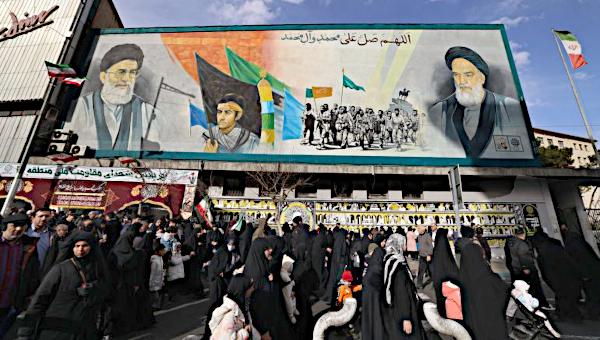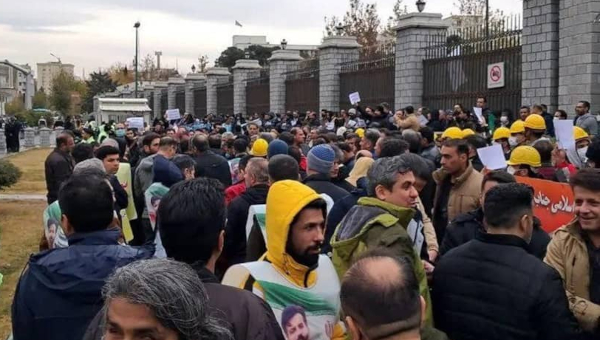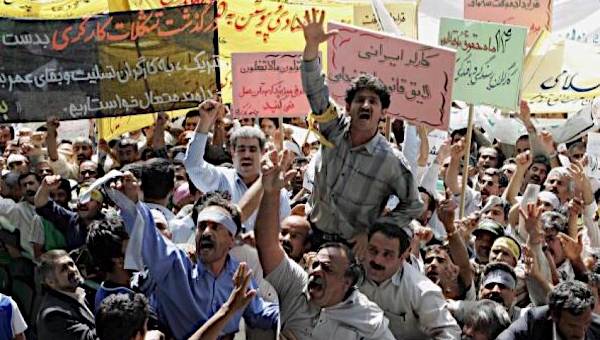Iran’s Response to the Israeli-US Invasion: Dilemmas for Progressive Responses in Iran and the Region
Not many saw it coming. In just 12 days, the Middle East was once again plunged into a catastrophic war – from Israel’s massive surprise invasion of Iran, to the US’s unprecedented military strikes, and ultimately, a sudden call for a ceasefire. On June 24, 2025, US President Donald Trump surprized the world by calling for an immediate ceasefire in the escalating Israeli-American war on Iran. Trump’s Iran policy has shifted wildly over the past few months: initially insisting only on preventing Iran from weaponizing its nuclear program, then moving toward a hardline “zero enrichment” stance, and later threatening for regime change declaring, “if the current Iranian regime is unable to MAKE IRAN GREAT AGAIN, why wouldn’t there be a regime change?” – MIGA, a provocative echo of his MAGA slogan!
Trump’s push for a ceasefire appears fragile, largely because Israeli Prime Minister Benjamin Netanyahu remains determined to weaken and isolate Iran at all costs. Declaring Israel the victor in this war, he remains firmly opposed to any agreement that allows Iran to retain even peaceful uranium enrichment capabilities. On June 27, following the ceasefire, Israeli Minister Israel Katz ordered the army to prepare an “enforcement plan” against Iran to “maintain Israel’s air superiority” and prevent its “nuclear advancement and missile production.” He warned: “We will act consistently to thwart threats of this kind. I suggest that the toothless snake’s head in Tehran understand and beware: Operation Rising Lion was just the preview of a new Israeli policy… immunity is over.”
At the same time, Trump faces growing domestic pressure from two opposing camps: MAGA-aligned isolationists who reject foreign interventions, and hawkish neoconservatives aligned with the Israeli lobby who favor a hardline stance. Eager to claim a unique victory – “defeating” Iran without dragging the US into another endless war – Trump now may view the ceasefire as an opportunity to broker a “historic” deal. But nothing is certain about him; he also declared he is “not offering Iran anything!” Trump appears more concerned with appearances than with pursuing a coherent long-term strategy. He is desperate for a symbolic win to declare that he has Made America Great Again!
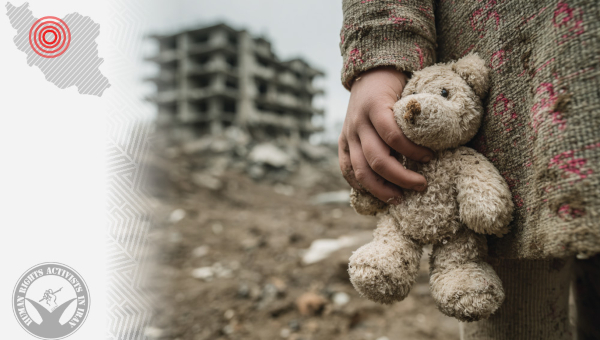
Everyone Declares Victory
For Iran’s leadership – which, like Israel, has also declared victory in the face of Israeli-American aggression – the challenge now lies in presenting any potential agreement as a legitimate resolution rather than a capitulation, particularly to hardliners who may see compromise as betrayal. With no trust in either the Israelis or the Americans, who might again attack Iran in the middle of negotiations, Tehran remains open to talks but insists on guarantees and confidence-building measures.
Yet the future remains uncertain. Trump has sent mixed and often contradictory signals, and many are left waiting for his next tweet to decode his real intentions! What is clear, however, is that Netanyahu’s government strongly opposes any deal that acknowledges Iran’s status as a regional power, including its nuclear sovereignty. Iranian authorities, for their part, need political cover at home to frame any compromise as both dignified and aligned with national rights.
While most Iranians demonstrated national maturity and civil solidarity during the 12-day war – standing together for the sake of Iran against the Israeli-American invasion – hardline factions may try to exploit this unity to falsely portray it as popular endorsement of their broader domestic and foreign policies. In reality, the situation is far more complex.
Taken together – Israel’s determination to further weaken Iran, uncertainty surrounding US actions, and the state’s reading of public reactions to the invasion – it remains to be seen whether the Iranian authorities will move toward weaponizing its nuclear program to deter foreign threats and consolidate power, or instead begin rethinking both domestic and foreign policy – building a sustainable deterrence not merely through military might, but more importantly through the consent of the people: democracy at home, and peace and diplomacy abroad.
Any constructive way forward must begin with a careful examination of how we arrived at this crisis, who the key actors are, and what ethical alternatives remain. Only then can we begin to consider responses that are both principled and strategic – responses that reject neofascist warmongering and domestic authoritarianism, and instead empower the Iranian people to shape a just, democratic, and sovereign future.
The Colonial Logic of US-Israel’s Invasion: The Road to June 13-24
The war, triggered by Israel’s large-scale and unprecedented invasion of Iran under the false pretext of preventing an “imminent nuclear threat” on June 13, 2025. This illegal act of aggression, fully backed by the United States and silently supported by much of Western Europe, unfolded during ongoing nuclear negotiations between Tehran and Washington. On June 21, 2025, in apparent coordination with Israeli airstrikes, the United States, under orders from Donald Trump, launched an illegal and attack on three of Iran’s major nuclear facilities: Fordow, Natanz, and Isfahan. Benjamin Netanyahu, Israel’s Prime Minister widely known for war crimes, and President Trump did not simply launch a war – they bombed the negotiation table, pre-empting diplomacy with destruction.
Ironically, Donald Trump – a president who built much of his public appeal on being “anti-war” – has become the first US president to directly attack post-revolutionary Iran, accomplishing a long-standing goal of Benjamin Netanyahu, the Israeli lobby, and American neoconservatives. This is especially revealing, given that a large part of Trump’s social base – the isolationist MAGA wing – has historically opposed US military interventions abroad. Yet it was under Trump’s leadership that the dream of attacking Iran materialized. Netanyahu skillfully exploited Trump’s political vulnerability and desire to appear “tough” on Iran, turning a manufactured crisis into a war that serves Israel’s strategic ambitions.
Two nuclear-armed states – the United States and Israel – have launched illegal attacks on a non-nuclear state, Iran, under the false pretext of an “imminent nuclear threat.” The United States remains the only country in history to have used nuclear weapons against civilians – not once, but twice, in Hiroshima and Nagasaki. Israel, meanwhile, possesses an estimated 200 nuclear warheads, making it the sole nuclear power in the Middle East. Yet its arsenal remains undeclared, unmonitored by the International Atomic Energy Agency (IAEA), and completely outside the framework of the Nuclear Non-Proliferation Treaty (NPT), to which Israel is not a signatory.
In a stunning display of hypocrisy, Israel has exploited the Iranian state’s often incendiary rhetoric toward Israel to manufacture the specter of an imminent “nuclear holocaust” – despite Iran’s nuclear program being subject to the world’s most rigorous IAEA inspections. Israel’s own nuclear weapons, though widely acknowledged, are shielded by a policy of “deliberate ambiguity” (Amimut in Hebrew) and remain exempt from any international oversight. What we are witnessing is not simply a case of double standards and nuclear hypocrisy but a structural injustice: a system in which international law and global institutions are routinely weaponized to serve the interests of hegemonic powers rather than uphold principles of justice or genuine non-proliferation.
But this should come as no surprise. Despite decades of rhetoric, Iran’s nuclear program has never been the primary concern for either Israel or the United States. The Israeli-American invasion goes far beyond alleged nuclear threats. It reflects a broader web of long-standing colonial ambitions, opportunistic geopolitical calculations, and internal political crises within Israel and its Western allies. At its core, the assault on Iran is not merely about nuclear capabilities; it is about power, domination, and the effort to contain Iran as a major regional force – a formidable rival to Israel’s long-standing pursuit of unchallenged hegemony in the Middle East. The aim has been, and continues to be, the strategic weakening and disintegration of Iran – not merely the Islamic Republic but Iran as a nation-state. This is about reshaping the regional balance of power in favor of Israel, as part of a larger project for a “New Middle East” in a “multiplex” world where Israel seeks to entrench its dominance.

In other words, this colonial war is not just about Iran’s uranium enrichment program. It’s about Israel’s dream of a “New Middle East” in which it is the sole hegemon, with Palestine erased from the agenda and all other regional countries weak, subordinated, or reduced to junior partners. Israel believes that with Syria dismantled, Hezbollah weakened, Hamas marginalized, and the Assad regime gone, Iran now stands isolated and vulnerable. In Netanyahu’s calculus, this was the perfect moment to pursue his long-time strategic objective of bombing Iran and reshaping the regional order. But how did we get here?
Netanyahu’s regime has been in deep trouble. After months of genocide and ethnic cleansing in Gaza, with no achievable endgame or exit strategy, both international and domestic pressure have intensified. However, ending the war on Gaza would mean his political collapse and prosecution for multiple corruption charges. Netanyahu needed a new narrative, a broader war, a bigger enemy. Iran became the scapegoat. After all, invading Iran has been part of Netanyahu’s strategic ambition since the late-1990s.
The Trump effect, whether through deception or coordination, played a decisive role. What appeared to be a nuclear negotiation between the US and Iran was, in reality, a carefully constructed illusion. Iran was scheduled to meet US delegates in Oman on June 15, yet just two days earlier, on June 13, Israel launched a surprise military invasion of Iran, catching Tehran off guard. This sequence of events now appears far from coincidental. With the US launching its own strikes on June 21, it has become clear that Israel’s attack was not unilateral – it was part of a coordinated operation with Washington.
Adding to the deception, Trump publicly stated just two days before the June 21 airstrikes that he would give diplomacy another “two weeks.” Instead, he authorized a massive assault on Iran’s nuclear facilities, suggesting that the negotiation track may have been disingenuous from the outset. Rather, it probably served as a cover to delay Iran’s defensive preparations and to manufacture international legitimacy for a planned war. Whether Netanyahu manipulated Trump or the two acted in concert, the outcome was the same: a calculated trap disguised as diplomacy. Trump’s shift in policy – from “no weaponization” of Iran’s nuclear program to demanding total “zero enrichment” – helped solidify the false pretext for escalation.
Moreover, Israel has skillfully weaponized Western anxieties, constructing Iran not merely as a threat to itself, but as a danger to “the West” at large. This narrative found open endorsement in Europe – Germany’s Chancellor, for instance, praised Israel for doing the “dirty work” on behalf of the Western world. European frustration with Iran – stemming partly from its alignment with Russia in the Ukraine war – translated into passive approval of Israel’s actions.
As noted, the role of divided Trumpism and the Zionist lobby also warrants attention. While the isolationist MAGA wing generally opposes foreign entanglements, neoconservatives allied with Christian Zionists continue to champion aggressive military intervention. The illegal US strikes on Iran on June 21 confirmed that the latter faction had gained the upper hand – at least temporarily. Netanyahu skillfully exploited Trump’s eagerness to flex his muscle against Iran, portraying war as a means to restore Israeli-American dominance in the region.
Israel, a “garrison state” by design, and the United States – with its vast military-industrial complex – do not bring peace or stability to the region through such illegal aggression. Quite the contrary, these attacks risk triggering the militarization of the entire region and may, in fact, strengthen the most authoritarian and securitized elements within Iran. Such assaults may contribute to the emergence of a garrison state within Iran itself – one with fewer prospects for democratization and greater incentives to move from a peaceful nuclear program toward potential weaponization as a deterrent.
Yet, this crucial geopolitical context is often overlooked by segments of the Iranian diaspora, particularly those distant from the lived experiences of the region. The urgent question we now face is not only how to confront this aggression but also how to resist it in ways that are ethical, effective, and rooted in reclaiming Iran for its people. This deserves careful elaboration. Allow me to explain.
Iran’s Internal Crisis: The Decay from Within?
Iran faces a dual internal challenge: on one hand, the state is stuck in a deep and multifaceted crisis; on the other, parts of the Iranian diaspora suffer from illusions and a disconnect that undermine effective resistance to the Israel-US colonial aggression. This is not to conflate internal dysfunction with external aggression, nor to shift blame away from the aggressors but rather to acknowledge that internal weakness can hamper collective agency. As the Persian saying goes, ‘az mâst ke bar mâst’ – we, too, have some responsibility for what befalls us!
In addition to receiving the most sophisticated weaponry from the US and much of the West – and in contrast to Iran’s inability to access advanced arms due to decades of crippling sanctions – Israel’s military breakthrough is also partly rooted in Iran’s internal factors, including the structural crisis of the Iranian state. For over four decades, the ruling clerical oligarchy has systematically crushed democratic opposition, eroded institutional legitimacy, and alienated the very society it claims to represent. The independent and principled opposition was not allowed to freely voice its critique of the ruling authorities’ domestic and foreign policy. The reformist movement of the 1990s, the Green Movement of 2009, the 2010s protests, and the 2022 “Woman, Life, Freedom” movement were all brutally repressed. The clerical crony capitalist regime never tolerated a meaningful and honest conversation with its own people about its regional and foreign policy – including the Iran-Iraq war (1980-88), the nuclear program, Iran’s policy toward the United States, Israel and Palestine, the ‘Axis of Resistance’, Russia-Ukraine war, Syria’s proxy/civil war and the Arab states. The office of velayat-e faqih (guardianship of jurist) and its closed circle of elites sponsored by petro dollars and the military-apparatus shaped Iran’s foreign policy, which in many cases did not serve Iran’s interests.
Instead of investing in a resilient civil society, the Iranian state prioritized internal repression. Students, women, workers, and dissenting voices were systematically silenced. Rather than allocating resources to sustainable development and building inclusive national resilience against external threats, the state channeled its efforts into crushing domestic opposition – ultimately weakening Iran’s ability to effectively defend itself. The military-security apparatus has become entangled in business projects and internal surveillance, focusing more on monitoring independent opposition voices at home than countering foreign infiltration. The repeated successes of Israeli Mossad point not only to serious breaches by Israeli intelligence but also to a deeper institutional crisis within Iran’s security establishment – one exacerbated by the state’s alienation of large segments of its own population.
When civil society is crushed and when even loyal, independent opposition is repressed, national defense becomes more fragile, not stronger. The recent presidential and parliamentary elections starkly revealed this legitimacy crisis: more than half of eligible voters abstained, and even moderate candidates failed to garner meaningful support. A state that has lost the trust and participation of its people cannot easily defend its sovereignty. Tragically, this internal decay has not gone unnoticed by Israel’s apartheid regime or by the forces of Trumpism in the United States – regimes that themselves hold zero moral credibility to speak of freedom in Iran. This is a critique from within: not to legitimize foreign aggression, but to emphasize that authoritarianism at home weakens national resistance to imperialism from abroad.
The second dimension of Iran’s internal decay lies in the delusions harbored by parts of the diaspora. A vocal but minority faction of the Iranian opposition in exile has become a mouthpiece for Israeli and American colonial aggression. Led by monarchists aligned with Reza Pahlavi – who infamously met with Netanyahu in April 2023, amid the ongoing genocide in Gaza – this group sees regime change at any cost as the only solution. They applaud war, dismiss civilian casualties, justify the bombardment of Iran’s infrastructure, and envision a so-called “secular democracy” built atop Israeli and American bombs! This amounts to nothing short of advocating for “Iranians without Iran”! – a vision of liberation of an abstract concept of Iranians at the cost of obliterating Iran!
This is not without precedent. During the Iran-Iraq War in the 1980s, another opposition group – the People’s Mojahedin of Iran under the leadership of Masoud Rajavi – aligned themselves with Saddam Hussein, a move that discredited them in the eyes of the Iranian public and ensured they would never regain its trust. Today’s diaspora opposition must learn from that historical failure.
While only a small number among these diaspora factions may act as direct foreign agents, many are simply naïve. Disillusioned by the Islamic Republic’s repression, they fall into the trap of believing that the enemy of their enemy is their friend. But history is clear: imperial powers do not build democracies. These opposition figures are treated by Israel and the West not as partners, but as disposable tools – “useful idiots” who will be discarded when their utility ends.
Ethics in Politics: Dilemmas of Possible Responses
At moments of heightened violence and foreign aggression, ethical and moral lines can easily blur. As noted earlier, some segments of the diaspora – primarily monarchists aligned with Reza Pahlavi – driven by their desire to see the Islamic Republic collapse, have even gone so far as to applaud Israeli and American military strikes, framing them as a necessary price for a better future. But their vision is a fantasy. The US-Israeli alliance seeks geopolitical dominance, not democracy in Iran, nor to liberate Iranians. Relying on external saviors, embracing military solutions, and disconnecting from grassroots democratic forces inside Iran pose a serious ethical dilemma. Ethical resistance must transcend these traps. A strategy of “regime change at any cost” amounts to advocating an unethical and self-defeating vision of “Iranians without Iran”! – a project in which Iran is destroyed in the name of defending its people, by powers that instrumentalize Iranians while erasing Iran itself. This politics of disposability mirrors the very authoritarianism it claims to resist. Ultimately, whether under authoritarian rule at home or in the hands of imperial forces abroad, Iranians are instrumentalized as pawns in someone else’s game.
Another position demands unconditional support for Iran’s ruling authorities in times of war. Even some critics of the state call for unconditional unity in the name of national survival. But history shows that authoritarian regimes often use war to consolidate power – and betray their people afterward. Hardliners readily exploit public solidarity against the illegal Israeli-American invasion to portray it as popular support for their domestic and foreign policies – when in fact, in times of war, people often rally around the flag to defend the nation against invaders, not to endorse the ruling authorities. Patriotism without democratic accountability leads to authoritarianism. A form of nationalist solidarity that aligns uncritically with an authoritarian state, even in opposition to illegal Israeli invasion, risks pursuing a strategy of “Iran without Iranians”! – a position that fails to centre the voices of Iranians themselves. An ethical stance must refuse the logic that justifies mass suffering in the name of justice, whether it comes from Israeli-American bombs or the bullets and batons of clerical oligarchy. True solidarity demands opposing both imperialism and authoritarianism – without instrumentalizing one to excuse the other.
A middle-ground approach calls for an immediate ceasefire – rejecting both Israeli/US aggression and domestic authoritarianism/militarism. While this position creates space for peace and the possibility of democratic change from within, it remains uneasy and uncertain. This is largely because Israel – driven by Netanyahu’s long-standing agenda to weaken Iran through war – and the United States – under Trump’s unreliable strategy – may not genuinely seek peace or a ceasefire. Instead, what is framed as diplomacy often masks demand for Iran’s unconditional surrender, with the deeper aim of exploiting the crisis to dismantle its strategic infrastructure. At the same time, Iran’s ruling elite may refuse to abandon its internationally recognized rights to uranium enrichment and missile defense. A ceasefire grounded in dignity – not in the humiliation of an entire nation – would be ideal. But a durable and just peace, as well as sustainable development and democracy, are more likely to be achieved through meaningful internal political transformation.
This brings me to the fourth and final strategic response, one that is principled and ethical: surrender not to the Israeli apartheid regime or Trump’s fascism but rather to your own people. It would be far more difficult for Israel and the US to sustain their illegal aggression against a state that enjoys the full support of the vast majority of its citizens. But this strategy, grounded in the idea of an “Iran by and for Iranians,” requires the state to take immediate and meaningful actions to begin regaining public trust. These actions must include: releasing all political prisoners; allowing free and fair elections without the veto power of the Guardian Council; removing the military-security apparatus from both governance and the economy; dismantling the clerical crony capitalism sustained by massive, quasi-governmental, tax-exempt foundations; and a sincerely apologizing to the Iranian people, enacted by dismantling the power of the clerical-military oligarchy. These steps would open the path toward democratization – toward an Iran ruled by its true sovereign: the people in all their diversity.
Only through democratization can Iran build lasting internal legitimacy. A democratic Iran – representing all its citizens, across social, political, and ideological spectrums – can defend itself without dependence on foreign powers. It can assert its full legal right to peaceful nuclear technology, challenge all forms of imperialism and exceptionalism, including Israeli and American variants, and expose the hypocrisy and double standards of the so-called international order. Such a transformation begins not with capitulation to external forces but rather with accountability to one’s own people.
Lessons to Learn: Five Conclusions
1. The Israeli-American invasion of Iran will not lead to democracy, but rather its opposite. It will produce a weakened state and society, paving the way for a new form of authoritarianism, chaos, and potential disintegration. A joint operation led by apartheid and fascist regimes cannot foster democratic transformation. In The Narrow Corridor, Acemoglu and Robinson make a useful general observation that liberal freedoms and democratic governance emerge from a balance between the extra-market political institutions that encourage a capable state and an empowered civil society. They describe this equilibrium as the “narrow corridor,” a conceptual space where both state and society are strong, mutually restraining, and mutually developing. Their typology includes three models: the “Absent Leviathan” (weak state, weak society), leading to disorder and a lack of public goods; the “Despotic Leviathan” (strong state, weak society), which produces authoritarianism; and the “Shackled Leviathan” (strong state, strong society), the only model conducive to sustained democratic freedoms and governance.
Israel – as an apartheid garrison state rooted in settler colonialism – and Trumpism, as the latest expression of American imperialism and exceptionalism, have no moral or political legitimacy to promote democracy in Iran. Colonial invasions dismantle, rather than build, the institutional foundations necessary for democratic transition. History consistently teaches that successful democratization and sustainable democracy are only possible through the delicate balance between a functioning state and a vibrant civil society.
War undermines this balance. It creates instability, militarizes governance, securitizes the public sphere, and expands the power of the military-security apparatus. Resources are redirected from development and civic participation toward survival and defense, eroding political freedoms. Far from fostering democracy, war paves the way for the emergence of garrison states, entrenches authoritarianism, and often serves as a pretext for repressing dissent. We must not allow Iran to become the next casualty of such a predicament – a battlefield where the democratic aspirations of a people are sacrificed to militarism, foreign intervention, and authoritarian resilience. The 1979 revolution was a homegrown, anti-despotic movement supported by a broad coalition. And yet, even that popular transformative moment gave way to clerical authoritarianism. Imagine what a regime imposed by Netanyahu and Trump would bring! It would be far worse.
2. The Israeli-American aggression against Iran is rooted in two interrelated Orientalist discourses: “Israeli exceptionalism” and “American exceptionalism.” Israeli exceptionalism – a discourse and policy in place since the founding of Israel – grants the country an extraordinary degree of impunity under international law. It renders Israel effectively immune to the enforcement of the Geneva Conventions, UN Security Council resolutions, international humanitarian law, and the Non-Proliferation Treaty (NPT), giving it a free hand to commit genocide, ethnic cleansing, occupation, and war crimes with impunity. The Nakba and numerous subsequent occasions in Palestine, as well as the deliberate targeting of civilians under the so-called “Dahiya Doctrine” in Lebanon – both in 2006 and again in 2025 – stand as blatant examples. Israel has also carried out repeated assassinations of Iranian nuclear scientists and has launched both covert and overt attacks inside Iranian territory under the false pretense of an “imminent nuclear threat” – a claim consistently rejected by both the IAEA and US intelligence reports. Despite being the only nuclear-armed state in the Middle East, possessing an estimated 200 nuclear warheads, and not being a signatory to the NPT, Israel continues to attack Iran, a signatory nation under one of the most rigorous IAEA inspection regimes, and with no nuclear weapons. This structural impunity is not just astonishing – it is emblematic of how international law fails when confronted with power. Israel’s structural impunity under international law continues to shield it from any meaningful accountability.
American exceptionalism similarly operates as a doctrine of impunity, shielding the US from the constraints of international law unless those constraints serve imperial interests. Understood within the broader framework of Orientalism, this exceptionalism is more than a benign belief in American uniqueness in democracy and freedom; it is a powerful ideological construct that rationalizes and sustains US dominance over other nations. It functions as both a cultural narrative and a geopolitical tool, reinforcing the material and ideological apparatus of American empire.
Together, Israeli and American exceptionalism work hand in hand to advance hegemonic interests, providing ideological cover for aggression and shielding both states from international accountability. In this context, an independent Iranian opposition must refuse to play by the rules of this imperial game. Legitimizing or collaborating with these structures of impunity undermines any credible path to justice, sovereignty, or genuine democratic transformation.
3. History teaches us that not all opposition to authoritarianism is democratic. Some groups opposing the Islamic Republic merely seek to replace one form of tyranny with another – often under the banner of freedom and democracy. A truly democratic struggle must be grounded in democratic and ethical principles, not just anti-regime slogans.
It is equally important to recognize that anti-imperialism and anti-Zionism, while vital and historically-necessary causes, can become empty signifiers – rhetorical tools exploited by both states and opposition groups to mobilize supporters or mask self-serving agendas. Iran’s ruling authorities, for example, have frequently invoked anti-Zionist and anti-imperialist slogans while, at times, betraying the very ideals of justice, freedom, and dignity they claim to uphold. Rhetoric such as Holocaust denial or uncritical support for certain Islamist factions has not only undermined Iran’s credibility but has also strengthened the Israeli right-wing forces and harmed the Palestinian cause. At times, Iran’s regional and foreign policy has unintentionally benefited regressive and reactionary forces, pushed conservative Arab states closer to Israel, and provided a pretext for increased US military and financial support to both Israel and Arab monarchies. The key lesson here is that context matters. Don’t judge by words alone. We need to examine the actions of both states and opposition movements, and assess their real-world consequences within specific political and historical contexts.
4. The coercive Islamization imposed by Iran’s clerical oligarchy has alienated a Muslim-majority society. This top-down, exclusionary approach – what I call “Islam without Muslims” – has weaponized both sacred and secular values to consolidate clerical power. The “Islam without Muslims” approach has marginalized women, youth, workers, ethnic and religious minorities, and political dissidents. Moreover, even respected principles, such as resistance to Israeli occupation of Palestine and American imperialism, have been co-opted by the state for authoritarian ends, resulting in disillusionment among segments of society. This backlash has created space for troubling reactions: Some now nostalgically long for the monarchy – a form of retrotopia, dismiss the Palestinian cause, or place false hope in American promises of democracy. When the state betrays both the sacred and the secular, it is no surprise that some people lose faith in both. Here again, as the Persian saying goes: az mâst ke bar mâst – we, too, have brought this upon ourselves!
Likewise, autocratic secularism, uncritical nationalism, and colonial modernity also betray the will and agency of the people. What Iran needs is neither forced Islamization nor autocratic secularism but rather a democracy rooted in its own culture, nourished through critical engagement with glocal (global + local) values of pluralism, freedom, and civil rights.
Caught between external colonial aggression and internal autocracy, between the rock of empire and the hard place of authoritarianism, and between the discourse of “regime change at any cost” (Iranians without Iran!) and uncritical defense of the ruling elite (Iran without Iranians!), there lies a third path: an Iran by and for Iranians.
An Iran enriched by democratic institutions can enrich uranium peacefully – without apology, in accordance with international law, and in defiance of Israeli-American arrogance. It can protect its sovereignty while forcefully resisting the Trumpist fascism, Israeli apartheid, and both wisely and ethically confronting the realpolitik of global (dis)order. Only such a democratic republic, supported by civil society forces, can speak credibly in the language of justice, freedom, and dignity – both to its own citizens and to the world.
5. Iran’s foreign policy should adopt a form of active neutrality, aligned with the dynamics of today’s multipolar world. Movāzene-ye Manfī (Negative Equilibrium) is best known as the signature policy of Iran’s democratically elected Prime Minister Mohammad Mosaddeq (1951–1953), who was overthrown by a joint British-American coup. Mosaddeq’s policy of active neutrality aimed to safeguard Iran’s independence and national interests against the colonial ambitions of both Britain and the Soviet Union to exploit Iran’s oil resources. A decade later, in 1961 during the Cold War, the emergence of the Non-Aligned Movement (NAM) expanded Mosaddeq’s vision to a global scale – advancing sovereignty, independence, and the collective interests of the Global South amid the neocolonial rivalry between the US and the USSR.
In the current multiplex world order, a rigid Cold War-era model of non-alignment is no longer sufficient. Instead, a reconceptualized “negative equilibrium” could offer Iran a proactive and principled foreign policy framework to navigate the complex geopolitics and realpolitik of the 21st century. Rather than strict neutrality, this updated approach requires greater flexibility in diplomacy and economic cooperation across multiple global and regional power centers – while avoiding dependency and remaining committed to ethical norms.
Iran’s post-revolutionary state – having endured the trauma of the Iran-Iraq War (1980-88) and now facing a new Israeli-American war (June 2025) – must hold firmly to the foundational principle of negative equilibrium: never taking sides in great power competition, and instead prioritizing Iran’s development, democracy, and sovereignty while remaining grounded in moral and legal commitments. Unfortunately, Iran’s uncritical support for Russia in its illegal invasion of Ukraine has backfired, alienating much of Europe, just as its unethical backing of the Assad regime disappointed many regional states. Similarly, the state-sponsored anti-American and anti-Israeli rhetoric and policies have neither effectively challenged imperialism/neocolonialism nor advanced the cause of Palestinian liberation. Instead, they have often functioned as tools of internal and external mobilization and consolidation for Iran’s ruling oligarchy. In some cases, they have even played into the hands of Israel’s right-wing factions – strengthening the discourse of “Iranophobia,” sidelining the Palestinian issue, securing increased US funding for Israel, and facilitating closer ties between Israel and conservative Arab regimes. An updated version of active neutrality in the age of multiplex world is needed.
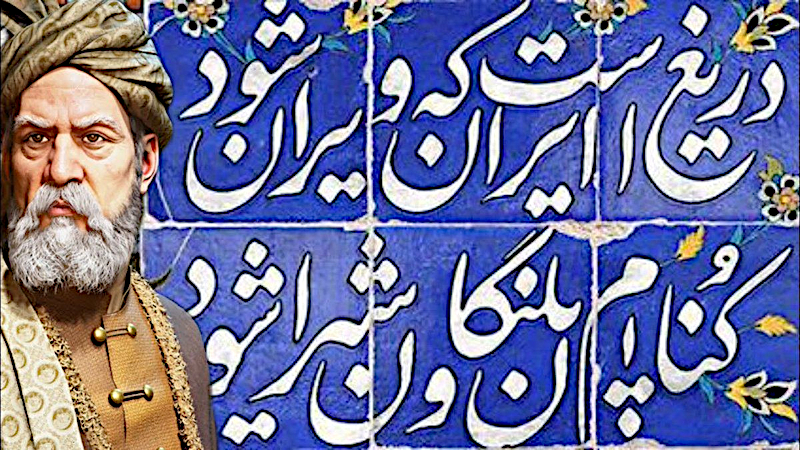
It is pertinent to close this essay by noting that Israel has labelled its unprovoked military offensive “Rising Lion.” But as the great Iranian poet Ferdowsi (940–1020 CE) warns:
“It is a pity for Iran to be ruined / To become a lair for leopards and lions!”
(دریغ است ایران که ویران شود / کنام پلنگان و شیران شود)
These so-called lions are, to borrow Rumi’s metaphor, nothing more than fake and “flag lions” (شیران عَلَم / Shīrān-e ‘Alam) – the lions embroidered on a banner! When the wind blows, they seem to move and attack, but in truth, it is the wind that animates them. The motion is an illusion; the power is not their own.
The real lions are the people of Iran – women, students, workers, and all the subalterns who resist both imperial injustice and internal oppression. May they rise – not in hatred, but in hope; not in revenge, but in justice; not for war, but for peace. The true lions are the demos, not the fascists. So let us say yes to the people, no to neofascism. •
A shorter version of this essay appeared on Jadaliyya website.


